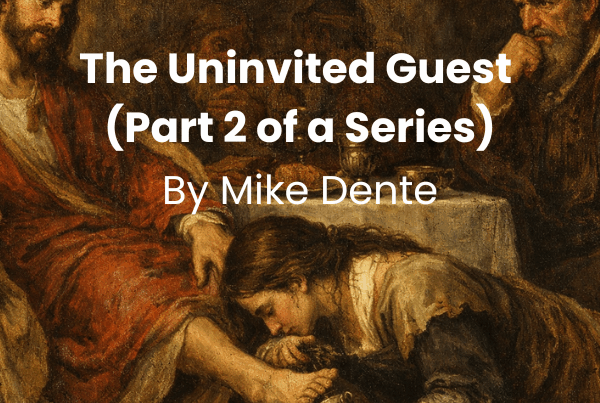
There is no such thing as the perfect church. Someone once said you’ll never find the perfect church–and if you do, don’t start attending there because you are imperfect, and you’ll ruin the perfect church!
Jesus had something to say to seven distinct churches in Asia Minor, almost 2,000 years ago–as He relayed His message to the Apostle John who was exiled off on the rocky island of Patmos in the Aegean Sea. With each of these seven churches, Jesus had something to communicate, and they all needed a remedy. That remedy was, and still is, the same remedy for every church. It is JESUS!
Just a quick glance at the seven churches shows us what they were struggling with (adapted from David Hocking):
Ephesus: Neglected Priorities
Smyrna: Satanic Opposition
Pergamos: Religious Compromise
Thyatira: Immoral Practices
Sardis: Spiritual Apathy
Philadelphia: Lost Opportunities
Laodicea: Material Prosperity
With almost all of these churches, there will be a commendation, a criticism and a correction.
There will be a characteristic of Christ (borrowed from Revelation chapter 1) that Jesus customizes about Himself in His address. There will also be a crown that will be offered to the church if they will overcome their sin and adversity. We will be looking at each of these seven churches and the cities they were planted in, to understand both their implications on the modern church and what we can learn individually and corporately from their feats and failures.
Today we turn our attention to the first of the seven churches: Ephesus.
The City
Ephesus was a major port city on the western coast of Asia Minor center for seaborne trade and the hub of the region’s road system. It was a thriving urban community of more than 250,00 to 300,000 people, very similar in population size to Anaheim, New Orleans, Honolulu, Cleveland or Tampa. By the late 1st century AD it was the fourth largest city in the Roman Empire. The Romans made Ephesus an administrative center for the province of Asia.
World renowned religious shrines, a spacious theater, stadium and elegant public buildings gave Ephesus an integral place in the cultural life of the entire region.
But don’t get the idea that Ephesus was a nice, clean administrative mecca! It was a city with rampant paganism–including the worship, manufacture and sale of fertility idols of the goddess Artemis/Diana (the goddess of the hunt)–whose idol was depicted with dozens of breasts. As you walked through the streets of Ephesus, there were little idols of breasts everywhere the eye looked.
Ephesus had a huge volume of occult arts & practices. Their temple to Artemis/Diana was one of the seven wonders of the ancient world and its largest religious structure. Paul had founded a church there, and Timothy was their pastor. They had the benefit of God working powerfully in this dark city, known for its worship of Diana. This was where people brought their handkerchiefs and aprons that touched Paul, and they were healed; and Demetrius the silversmith started a riot because he thought he would lose money from his business for Artemis (Acts 19). This was a city with both great opposition and a great move of God’s Spirit.
The Characteristic of Christ
Revelation 2:1: “These things says He who holds the seven stars in His right hand, who walks in the midst of the seven golden lampstands.”
It is believed by many that the seven lampstands are the churches, but also the Church at large. This is reminiscent of the Jewish menorah, at Hanukkah. We as Christians are to be the light of the world, a lampstand burning for others to see. Notice that Jesus is holding the Church, and He’s walking among us. These two ideas are a picture of intimacy: Jesus is both holding the Church in His right hand (the hand of blessing), but He is also walking among us. He isn’t far off, distant, untouchable, unreachable; you don’t have to dial long distance to speak or hear from Him. He’s right here among us–among you and I–and He wants us to be at peace in His presence. Theologically that is the balance between His transcendence and His immanence. God is transcendent: above His creation; yet He is also immanent: present and with us.
What a great picture of Jesus’ steadfast love. He desires intimacy, love, relationship with us. He wants to be near. Now let’s read the commendation.
The Commendation
Revelation 2:2-3: “I know your works, your labor, your patience, and that you cannot bear those who are evil. And you have tested those who say they are apostles and are not, and have found them liars; and you have persevered and have patience, and have labored for My name’s sake and have not become weary.” Also notice verse six: “But this you have, that you hate the deeds of the Nicolaitans, which I also hate” (Revelation 2:6).
Jesus commends them for three things:
Their Duty: They were hard-working, busy ministers. You could nickname them “the church of Saint Martha”! Lots of work–but busyness in a church doesn’t always mean the Spirit is at work. Often when things are simple, you can focus your energy on what is most important, things like Acts 2:42 instead of all the flurry of things some churches expend all their energy doing. But Jesus was commending them for their hard work.
Their Doctrine: The church at Ephesus could not bear those who were evil. They would vet, test and confirm if someone was true or false according to Biblical orthodoxy, and if they were false, the church would have nothing to do with their teaching. The word “bear” is the same word used of Jesus carrying the cross. This church could not bear the weight of bad doctrine. They couldn’t carry it. They wouldn’t tolerate it. The church of Ephesus knew their doctrine; they knew what they believed. Would that the church of Jesus Christ today be more like Ephesus on that point! Many Christians today can’t even explain the Gospel plainly, or communicate sound doctrine.
Thirdly, Jesus commended Their Determination: They were persevering and hanging in there despite a lot of hardship, oppression and suffering. Jesus says, “You have not become weary.” That’s amazing! They were the marathon runners of the church! Many people give up as soon as there is a problem in their faith, but not the church of Ephesus.
So, with all of these positives, can’t Jesus just stop there? I mean, isn’t that a great church to be a part of? Doesn’t matter if you are doing amazing things for God, if you have separated yourself from God. What would Jesus say as a word of criticism to this upstanding, doctrinally-sound church?
The Criticism
Revelation 2:4-5: “Nevertheless I have this against you, that you have left your first love. Remember therefore from where you have fallen; repent and do the first works, or else I will come to you quickly and remove your lampstand from its place—unless you repent.”
The church at Ephesus had their doctrine down, but no devotion. Later we’ll see that Thyratira has the love down, but no doctrine. We need a good balance of truth and love. People that are all truth with no love tend to forget that they too were once a sinner, and God’s love and mercy saved them. People with too much love and not enough truth tend to embrace everyone and fall for anything because they don’t stand for something. The church in Ephesus was a busy, successful church—but they were so busy they had forgotten God.
They knew what doctrines to believe, but they had neglected who the doctrines point to! Jesus says, “You have left your first love.” You’ve forsaken it. The church as a group had lost the intimacy they once had with God. Interesting that they lived in a city known for its worship of Artemis/Diana, who was known as the goddess of the hunt, of children and animals. She was very independent and frivolous and was known for not being faithful to her husband, though she was considered an eternal virgin. Interesting! Ephesus, known for worshipping a goddess that would have no intimacy with a man, had a church that had lost its intimacy with Christ!
The Correction
Revelation 2:5: “Remember therefore from where you have fallen; repent and do the first works, or else I will come to you quickly and remove your lampstand from its place—unless you repent.”
Remember. Repent. Return.
Remember where you used to be with Jesus. Repent–turn back. Acknowledge and own up to the fact that you have fallen away. You haven’t lost your first love. You’ve left it. You’ve drifted. You’ve allowed other things to creep in. Then return to those things you did when you first fell in love with God. When’s the last time you lost track of time when you were spending it in God’s word, in worship or in prayer? If we don’t change, there is another “R”: Remove—Their lampstand would be removed, implying immediate judgment. This could mean that their witness would cease to exist—the light would fade away. Sadly, that’s exactly what happened. Jesus came and removed their lamp–their influence–their witness to their city.
Within time the church at Ephesus died out. Just 30 years earlier, Paul had ended his letter to this church with this admonition:
“Grace be with all who love our Lord Jesus Christ with love incorruptible” (Ephesians 6:24).
Thirty years after Paul wrote that to them, their undying love had died. Their love incorruptible had become corrupted. They had turned their back, forsaken God, even though they still did all of these things in His name and were known for their deeds. They had left their first love, and they needed to repent and turn back. That is what all of us need today: a fresh look at our priorities and our love for the Lord Jesus Christ.
The Crown
Revelation 2:7: “He who has an ear, let him hear what the Spirit says to the churches. To him who overcomes I will give to eat from the tree of life, which is in the midst of the paradise of God.”’
The crown–the reward–is the right to eat from the tree of life in God’s garden. Adam and Eve were never given that right, because they forsook their first love and disobeyed in rebellion against God. If they did eat, they would be forever stuck in that state of separation from God.
So He banished them from the garden after they ate from the tree of the knowledge of good and evil.
Today, if we would overcome our cold hearts for God, and return to our first love, He will allow us access one day to the tree of life, and that intimacy can once again be restored. Isn’t that incredible? God wants intimacy with you. He is always there; it is we who turn away and lose our love. He loves you completely and will never lose His love for you.
The Modern Church
In like manner, we can leave our first love, the Lord Jesus. In fact, there may be many more than this, but here are four ways that we leave our first love:
1. We replace LOVE with LAW.
We think erroneously that God wants us to simply follow a list of principles and that equates to a relationship. Now I have to be careful here because Jesus did say in John 14:21 that, “Whoever has my commands and obeys them, he is the one who loves me.” Obviously the best expression of love for God is to obey His commands. But the danger is when we equate love with merely principles. We begin to set up rigid rules and guidelines and then start serving God out of duty, not out of desire. We can see lots of people doing things out of obligation: military, employees, salesmen, spouses, love relationships. Family Feud asked people to “Rate your marriage on a scale of 1-10.” They surveyed 100 people, and the top answer was rated at a one. That’s what happens when we leave our first love. It’s obligation, not love. Does that describe you today in your relationship with God?
2. We replace LOVE with EMOTION.
Sometimes we feel that we must experience goosebumps or some type of “word from the Lord'” to “feel” the love of God. Charles Spurgeon said: “Deep waters run silently. Great feeling is dumb: There is a frost of the mouth when there is a thaw of the soul.”
Does that mean we should never express our emotions? Of course not! God created us with emotions, so we would be minimizing the Imago Dei if we suppressed any and all emotions. Jesus wept over Jerusalem, had compassion for the crowds who were unshepherded, drove out in anger the money changers from the temple. We read in Scripture that the Holy Spirit can be grieved. These are all emotional responses, and we would be truncating our love for God if we were always suppressing joy or sadness. But we shouldn’t base the quality or reality of our love simply on how we raise our hands, pray our prayers, or cry our tears. I love this quote from Dr. M. Scott Peck:
“Genuine love is volitional rather than emotional. The person who truly loves does so because of a decision to love. This person has made a commitment to be loving whether or not the loving feeling is present. It if is, so much the better; but if it isn’t, the commitment to love, the will to love, still stands and is still exercised. Conversely, it is not only possible but necessary for a loving person to avoid acting on feelings of love. I may meet a woman who strongly attracts me, whom I feel like loving, but because it would be destructive to my marriage to have an affair, I will say vocally or in the silence of my heart, ‘I feel like loving you, but I am not going to.’ My feelings of love may be unbounded, but my capacity to be loving is limited. I therefore must choose the person on whom to focus my capacity to love, toward whom to direct my will to love. True love is not a feeling by which we are overwhelmed. It is a committed, thoughtful decision.”
Have you replaced love for emotion? Have you left your first love?
3. We replace LOVE with LABOR.
This was prescriptive of the church in Ephesus. They had gotten so tied down with their heretic-hunting that they forgot that church is where people experience the love of God and the love of God’s people. How many pastors take a day off from the ministry (or two!) and spend it simply enjoying their families? How many husbands take a consistent date night with their wife? How often does a family sit down and enjoy a meal together without technology? How many families spend time in devotions together? What we tend to find in the church is that people are inundated with diligent, assiduous busywork. How many of us stand exposed as being bogged down in the busywork of Christianity instead of choosing what is better?
4. We replace LOVE with INDIFFERENCE.
We become numb to the things of God because they become familiar. Instead of keeping our zeal for the Lord as we serve Him, we get bored by the same old same old. When there is disinterest in your heart for the things of God it is time for a renewing of your mind! The church of Ephesus had warm hands but cold hearts. Does that describe you today in your relationship with God?
I was shocked by the relevance of this story to our current condition in the world: Muynak was once a thriving fishing port on the Aral Sea. But today, according to James Rupert of the Washington Post, Muynak sits on the edge of a bitter, salty desert. Sand dunes are strewn with the rusted, hollow hulls of a fishing fleet that once sailed high above on the surface of Central Asia’s fountain of life.
Things began changing 30 years ago when Stalinist planners began diverting the Aral’s water source to irrigate the world’s largest cotton belt. No one, however, envisioned the environmental disaster that would result. Weather has become more extreme; the growing season has been shortened by two months, and 80 percent of the region’s farmland has been ruined by salt storms that sweep in off the dry seabed.
What happened at Muynak parallels the history of the church of Ephesus. Once a thriving spiritual community, the Ephesian believers diverted their attention from Christ to works done in His name. They had lost sight of what was most important in their relationship with Christ— their love for Him.
Perhaps that is where the modern church is today. Forgetting the height from which we’ve fallen, we need to repent that we may experience times of refreshing from the Lord once again. We must return to our first love and remember that He first loved us. That first love–that pure love–the love that never let you go–the love that accepts you even now–with all of your rebellion and coldness toward Him–is available for each of us. We may not find the perfect church–but we have certainly discovered perfect love.






